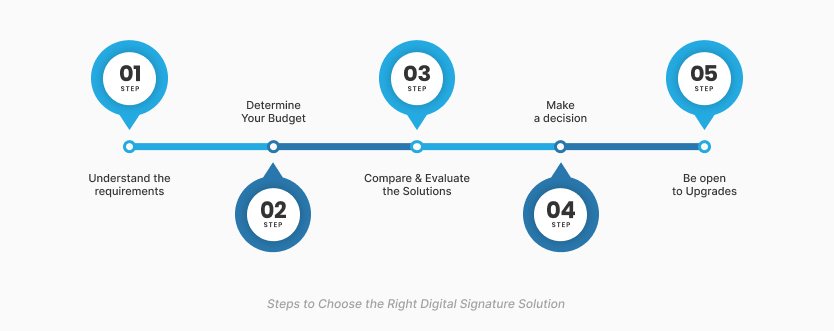Enterprise Guide to Choosing the Right Digital Signature Solution
The shift to digitalisation and remote work is unstoppable across the Kingdom of Saudi Arabia (KSA), which drives the need for paperless documentation. Instead of traditional tools and techniques, digital alternatives like automated workflows, the use of AI, cloud computing, online payments, etc, are being embraced by businesses across the globe. Amidst all these technological advancements, digital signature is an essential factor that companies must not ignore. It makes signing and managing documents easier, quicker, and more secure. To make your e-documents legally valid and secure them from cyber fraud and other unethical practices, there is no better way than digital signatures.
A suitable digital signature solution can significantly streamline your business processes and accelerate the digital transformation in your organisation. However, with an array of options providing digital signature solutions around us, finding the right one can be a real challenge. So, this blog is here to help you choose the right digital signature solution in the KSA.
A Quick Overview of the Digital Signature and Its Significance
Leveraging technology in every sphere of business tasks is paramount in today’s digital world. Therefore, signing documents like contracts, forms, agreements, etc., digitally is not optional anymore–it has become essential. The digital signature is a type of signature issued online, utilising cryptographic techniques, which binds the signee with the signature. It helps to maintain document integrity. If the document is altered or tampered with in any way, the digital signature becomes invalid.
However, many times, a digital signature is often cited as an e-signature or electronic signature, although they are not synonymous. To elaborate more, e-signature is a broader umbrella term that covers digital signatures. Any type of electronic sign that is done without a physical pen and paper is called an e-signature. In contrast, a digital signature is a more advanced and secure e-signature that involves encryption/decryption technology to ensure better authentication and security.
There are differences in their usages as well. Simple e-signatures are used in business contract processes, as they help in quick business deal approvals through fast contract signing. On the other hand, digital signatures, like our fingerprints, are unique for every individual. So, with its cutting-edge features, it can be used to keep confidential documents safe and secure across diverse industries like finance, defence, etc.
When a document is signed with a digital signature, a private key is issued to the signee, which a public key certificate can validate. Thus, the digital signature becomes a secure and legally strong e-signature method. Businesses can opt for it to protect their organisation from fraudulent documentation, data fabrication, forgery, identity theft, counterfeiting, and so on.
Key Considerations to Choose the Right Digital Signature Solution:
As the largest country in the Middle East, KSA, or the Kingdom of Saudi Arabia, has implemented several regulations, including the Electronic Transaction Rules (2007), to ensure the safety, convenience, and integrity of the country’s assets. The use of a digital signature is validated under the laws. In fact, digital signatures play a crucial role in helping companies in the KSA to stay competitive in this tech-first era. But, for leveraging the maximum potential of digital signs, some key factors need to be checked before you opt for any digital signature solution. They are mentioned below:

Security features:
The digital sign solution you choose should offer secure and verified authentication methods. For example, security features like mobile device OTP authentication or multi-factor authentication ensure the confidentiality, safety, and integrity of the documents. With a proper user identity verification process, the digital signature saves documents from being mishandled by unauthorised persons.
Integration with existing systems:
Just like security, compatibility with the existing system in the organisation is equally important. Check how well the digital signature software can integrate with the existing CRM platforms and other relevant apps in your company. The software must have respective APIs and pre-built connectors that embed digital signing into your existing system seamlessly and ensure a streamlined work process.
User experience:
Also, it is crucial to ensure that users don’t have to go through a manual every time they have to sign a document. So, the digital signature solution you choose should be user-friendly. The admin and signee interfaces need to be less complex, intuitive, and easy to understand. The overall steps for accessing, reviewing, and signing documents through the solution should be hassle-free. With minimal training and a simple process, users should be able to sign up for it and use it as per their requirements.
Technical specifications:
The user experience is not limited to interfaces only. The technical details of the digital signature solution also contribute to the betterment of their experiences. If the remote digital signing process imposes complicated or specific hardware or software requirements, that can be a difficult scenario for many users. So, before you opt for a digital signing tool, go through and evaluate the technical specifications like cryptography standards, signature formats, and timestamp authorities properly. Check the consistent availability of features like audit trails, secure storage of private keys, and offline verifications to avoid any miscommunication, non-compliance, and security issues.
Regulatory compliance with KSA laws and standards:
Different countries issue diverse regulations on digital signature processes. Choose a solution that complies with KSA laws and regulations requirements. Steered by its ambitious Vision 2030 for a thriving economy, the KSA has embraced digital signatures, while issuing multiple laws related to the use of such signatures. Make sure that the digital signature software or vendor you rely upon complies with the specific legal requirements.
Customisation options:
Besides all these considerations, the scope of customisation is another vital factor to take care of. Several customisation options are available with new-age digital signature solutions. For example, to enhance the user experience and help them work effortlessly without errors, bulk custom branding, configurable recipient options, etc., are offered. Based on signing scenarios in your professional spheres, you can decide your customisation requirements and choose a solution that provides them.
Long-term Validations and analytics:
To understand the usage frequency, scope of improvement in the work process, etc., the usage analytics must be visible in your digital signature solution. The analytics dashboard should show the numbers and statuses of signatures completed, in progress, pending, and scheduled. Moreover, if you have documents requiring long-term signatures, check how far in the future your signatures can be verified in that solution.
Keeping these key considerations in mind helps to find the best-suited digital signature solution for your organisational purposes.
Steps to Choose the Right Digital Signature Solution
Maintaining the integrity of digital assets, including documents, becomes easier than ever with the right digital signature solutions. However, to select the best digital signature solution for your business among various options, you need to follow some crucial steps, which are as follows:

Understand the requirements:
When you first decide to switch to a digital signature from traditional options, the first thing you need to do is get a clear understanding of the documentation requirements of your organisation. Ask yourself- how many documents do you have to sign regularly? What kind of document needs to be signed mostly? How many users are supposed to use the signature solution?
Determine Your Budget:
Every organisation has a pre-decided budget for every aspect of the business, including innovative approaches and upgradations. In that scenario, if an organisation decides to adopt digital solutions for signing documents, the budget must be determined at the very beginning. As per the affordable budget and requirements, organisations can proceed to select a suitable digital signature solution.
Compare and Evaluate the Solutions:
Make a list of digital signature solutions that you feel are suitable for your organisational documents. Compare their features, possible upgrades, and costs with your requirements and budget. Moreover, evaluate their customer support policies, privacy standards, and regulation compliance management. Check their reputation through their client feedback online to understand their capabilities better.
Make a decision:
Once you get clarity on your documentation requirements and evaluate the available options thoroughly, it’s time to make a final decision to get a digital signature solution. With the installation of the solution, make sure that it is integrated into the overall existing systems, including ERP, CRM, billing, and so on. It helps to streamline the business workflow and ensure faster and better outcomes.
Be open to Upgrades:
Just like other technological innovations, any digital signature software is likely to come with upgrades and the latest features over time. It is not a tool that requires one-time attention during installation. So, be aware of the possible advancements, and whenever you are notified about them, opt for them without any delay to ensure more efficient performance.
Thus, based on the number and type of your organisational documents, budget, users’ demands, etc., you can choose the best digital signature solutions for your organisation.
SquareOne: Your One-stop Solution for Digital Signature Requirements
Final Thoughts
By evaluating the capabilities of ensuring trust, compliance, security, and efficiency, you can determine which digital signature solution is right for your organisation. Once you start using digital signatures, better employee management, business deal handling, and customer satisfaction are ensured. However, discuss your current business process, future strategies, and goals clearly with the digital signature solution provider. It will help them to understand your business vision and make their services align with it efficiently.
Looking forward to integrating a suitable digital signature solution into your business in the KSA?
Meet our SquareOne experts today.
Related reading:
Looking forward to integrating a suitable digital signature solution into your business in the KSA?
Meet our SquareOne experts today.

















